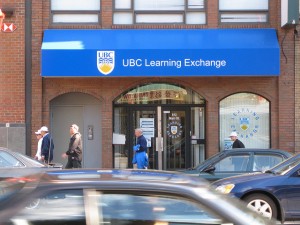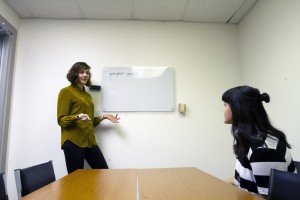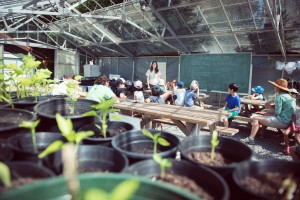
The Field School is held at the UBC Learning Exchange, in the Downtown Eastside. The location provides a place for students as they begin to engage with community groups throughout Vancouver, by challenging some of their implicit assumptions about social class and academic classrooms. The Field School further expands student learning beyond the Point Grey campus by partnering with several community groups that serve as sites for student service-learning.Service-learning is a pedagogical approach that encourages students to focus on learning through service, in partnership with the Centre for Community Engaged Learning, with the intention of benefiting both the student and the community group they are partnered with. Service-learning is distinct from volunteering, where the intended beneficiary is the recipient. Instead, the service-learning experience is integral to the course work.
Community partners are essential for making community based learning possible. Partner organizations identify projects for students to contribute to, and guide student engagement with the organization.
The Field School follows an asset-based approach to community development, which focuses on cultivating individual strengths and amplifying the assets and resources that exist in a community.
 A principle focus of the UEFS is teaching students to conduct in-depth, ethnographic research in collaboration with the organizations that help build social cohesion and engagement throughout Vancouver. Students will gain hands-on experience as researchers, develop their writing and communication skills, and gain professional experience working with a community group.
A principle focus of the UEFS is teaching students to conduct in-depth, ethnographic research in collaboration with the organizations that help build social cohesion and engagement throughout Vancouver. Students will gain hands-on experience as researchers, develop their writing and communication skills, and gain professional experience working with a community group.
 A principle focus of the Field School is teaching students how to conduct and disseminate in-depth, community-based research on the social, political, cultural, and economic lives of people living Vancouver. Field School students learn a range of ethnographic and broader social science methods as they conduct fieldwork and complete projects defined in conjunction with community partners. Each student prepares a final essay and presents a research project for the course, either individually or with a group.
A principle focus of the Field School is teaching students how to conduct and disseminate in-depth, community-based research on the social, political, cultural, and economic lives of people living Vancouver. Field School students learn a range of ethnographic and broader social science methods as they conduct fieldwork and complete projects defined in conjunction with community partners. Each student prepares a final essay and presents a research project for the course, either individually or with a group.
Organized by the UBC Departments of Anthropology and Sociology as a fieldwork-based course, the UEFS trains students on how to conduct in-depth, community-based research concerned with the social, political, cultural and economic lives of urban Vancouver residents. Students will have a hands on learning of ethnographic methods, including techniques for participant observation, writing field notes, conducting in-depth interviews, as well as interpretative analysis through their work at the community organizations. By immersing themselves in ethnographic research, students gain valuable experience linking hands-on research in the classroom to theoretical paradigms related to the study of migration, transnationalism, global diasporas, and multicultural communities.
See More about The Course
Students are fully trained to conduct ethical research according to the Tri Council Policy Statement on Ethical Conduct for Research Involving Humans . Students are expected to resolve any problems that arise through discussion with community partners and instructors. The Field School is approved on an annual basis by the UBC Behavioural Research Ethics Board.
Particular concerns should be addressed to: field.school@ubc.ca
 Faculty of Art
Faculty of Art